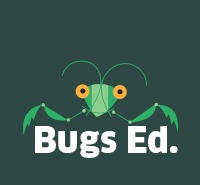Book a workshop to celebrate Insect Week 2025 – 23rd-29th June
Kindy, preschools, pre-prep & early learning centre Workshops
At Bugs Ed. we believe you are never too young to learn about the amazing world of insects! So we have recently developed a pre-prep program that has been a huge hit so far in Kindergartens and Child Care centres.
The program is fun and interactive, with lots of photographs, props and displays of both live and dead insects to keep inquisitive little people engaged and entertained. Resin mounted creepy-crawlies and compound-eye glasses allows for hands-on fun and our audiences love the chance to hold a friendly stick insect.
Our workshops are best suited to ages 3 and up. Do you have younger children who don’t want to miss out on the action? Consider hiring some of our insect display cases. These can be set up and viewed by the littlies while we visit the older kids. Costs apply.
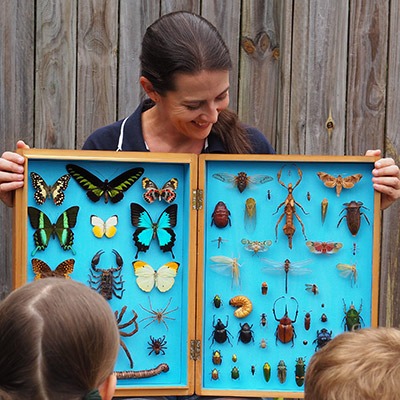
Super Senses
This workshop promotes active learning processes by encouraging students to investigate the natural world of minibeasts. Through play-based activities, we look at how our bodies are different from the bodies of insects. Students will imagine what it is like to be an insect and act out how they see, smell, taste and sense their environment. What would it be like to taste with your feet? Imagine having ears on your knees! What would it feel like to breathe through holes in your stomach? Amazing cases of preserved insects and arachnids from around the world and live Australian insects are used to illustrate ideas and helps to make the learning experience very interactive and hands-on. This workshop is a great addition to the Staying Alive topic in the Primary Connections unit. Or choose from one of our Primary School topics which can be adapted for a younger audience.
Primary School Workshops
Our primary school workshop topics have been carefully developed and are continually revised to compliment the Australian Curriculum in Science. Whether your school has implemented the Australian Curriculum V9, still operates under version 8.4, utilises C2C, the Primary Connections Units or other teaching packages, there is bound to be a Bugs Ed. workshop that will suit your requirements. If not, we are happy to tailor a workshop to meet your specific needs.
Most of our workshops combine a PowerPoint presentation with amazing photographs to introduce key concepts, large display cases of preserved insects and arachnids from around the world and live Australian insects to see up-close (you can even hold a stick insect)! Hands-on resources to see and touch and ample time to ask questions, makes this a fun, interactive experience for all.
Book one of the workshops below or contact us to have one specially designed to meet your requirements.
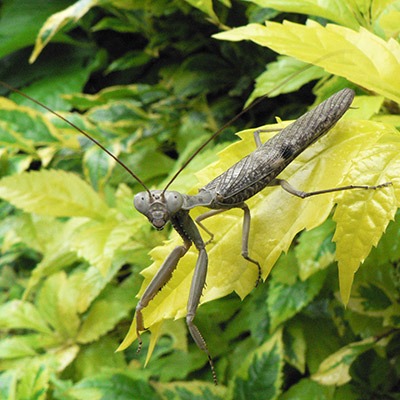
Secrets to Success
Insects are the most diverse and successful group of organisms on Earth. They have walked the planet for nearly 400 million years and during this time have colonised every possible habitat. Learn the secrets to their success by looking at their external features and how they use them to meet their needs in the places they live; capture prey and exploit different food sources; elude predators; and cope with life in harsh environments.. This workshop is a great introduction to the world of insects for all ages. It combines the aspects of many of the other workshop topics into one action-packed session. It is perfect for students studying the basic needs of plants and animals and how the places they live meet those needs, and the following Biological Science curriculum content descriptions: Version 8.4 ACSSU002 for Prep ACSSU017 for Year 1 ACSSU211 for Year 1 ACSSU043 for Year 5 ACSSU094 for Year 6 Primary Connections – Staying Alive for Prep Primary Connections – Schoolyard Safari for Year 1 Version 9 AC9S1U01 for Year 1 AC9S3U01 for Year 3 Primary Connections – Finding Features for Prep Primary Connections – Thrive and Survive for Year 1
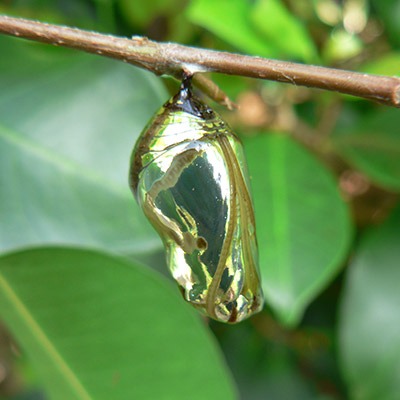
Insect Life Cycles
Living things grow, change and produce offspring and the journey an insect takes from egg to adult is intricate and interesting. New skins must be grown to accommodate increasing waistlines and growing wings requires some special strategies. This workshop uses insects to highlight the differences between metamorphic (e.g. butterflies and beetles) and non-metamorphic (e.g. stick insects and praying mantises) life cycles of animals. A combination of close-up photographs; preserved Insect specimens, pupae, cocoons, egg cases and shed exoskeletons; and live insects such as stick insects and caterpillars, allows students to observe and compare the physical characters of insects as they move throughout the different stages of their life cycles. This workshop is great for students studying change and growth in different organisms and perfectly complements the Biological Science curriculum: Version 8.4 ACSSU030 for Year 2 ACSSU072 for Year 4 Primary Connections - Watch it Grow for Year 2 Version 9 AC9S3U01 for Year 3
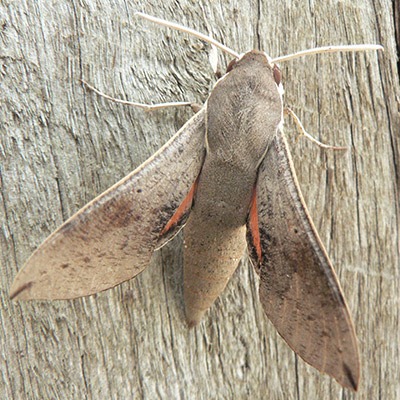
Insect Classification
This workshop introduces students to the most common groups or Orders of insects we encounter around our homes, gardens and schools. We focus on the unique external features of each group and learn how the various types of insects differ in their behaviour, habitats and lifecycles. A specially designed dichotomous key allows students to classify your choice of either provided insect specimens or photographs into various Orders. This is a fun, hands-on workshop that illustrates the use of dichotomous keys in science and introduces key concepts and terminology for the classification of organisms. This workshop is great for teaching students how living things can be grouped on the basis of observable features and can be distinguished from non-living things, and complements the Biological Science curriculum: Version 8.4 ACSSU044 for Year 3 Primary Connections – Feathers, Fur or Leaves for Year 3
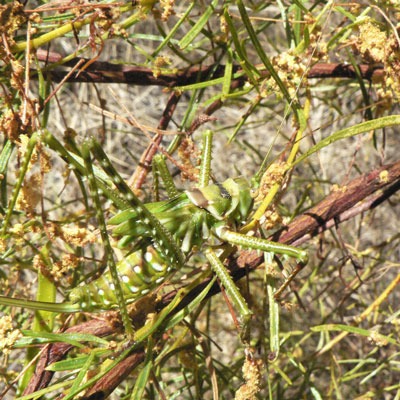
I’m a survivor
If there is one thing insects are good at, it’s learning how to survive and thrive in harsh environments. Their structural features; adaptations; relationships with other organisms; and complex behaviours have allowed them to overcome the most formidable landscapes, from searing hot, dry wastelands; to freezing cold caves; to highly industrialised urban jungles. Learn how insects can withstand being frozen; live in water three times saltier than the ocean; and avoid getting cooked as they move about boiling hot thermal pools, scorching deserts and fire ravaged bushland. We also explore the unusual food sources that insects consume in harsh environments and how they can make a meal out of just about anything – toxic plants, venomous creatures, charred vegetation, waste products and human foodstuffs. This is a great workshop for exploring how the physical and behavioural characteristics of insects enable them to survive, find food and hide from predators in some of the most inhospitable places on Earth. This workshop addresses the following Biological Science curriculum content descriptions: Version 8.4 ACSSU073 for Year 4 ACSSU043 for Year 5 ACSSU094 for Year 6 Version 9 AC9S5U01 for Year 5 AC9S6U01 for Year 6
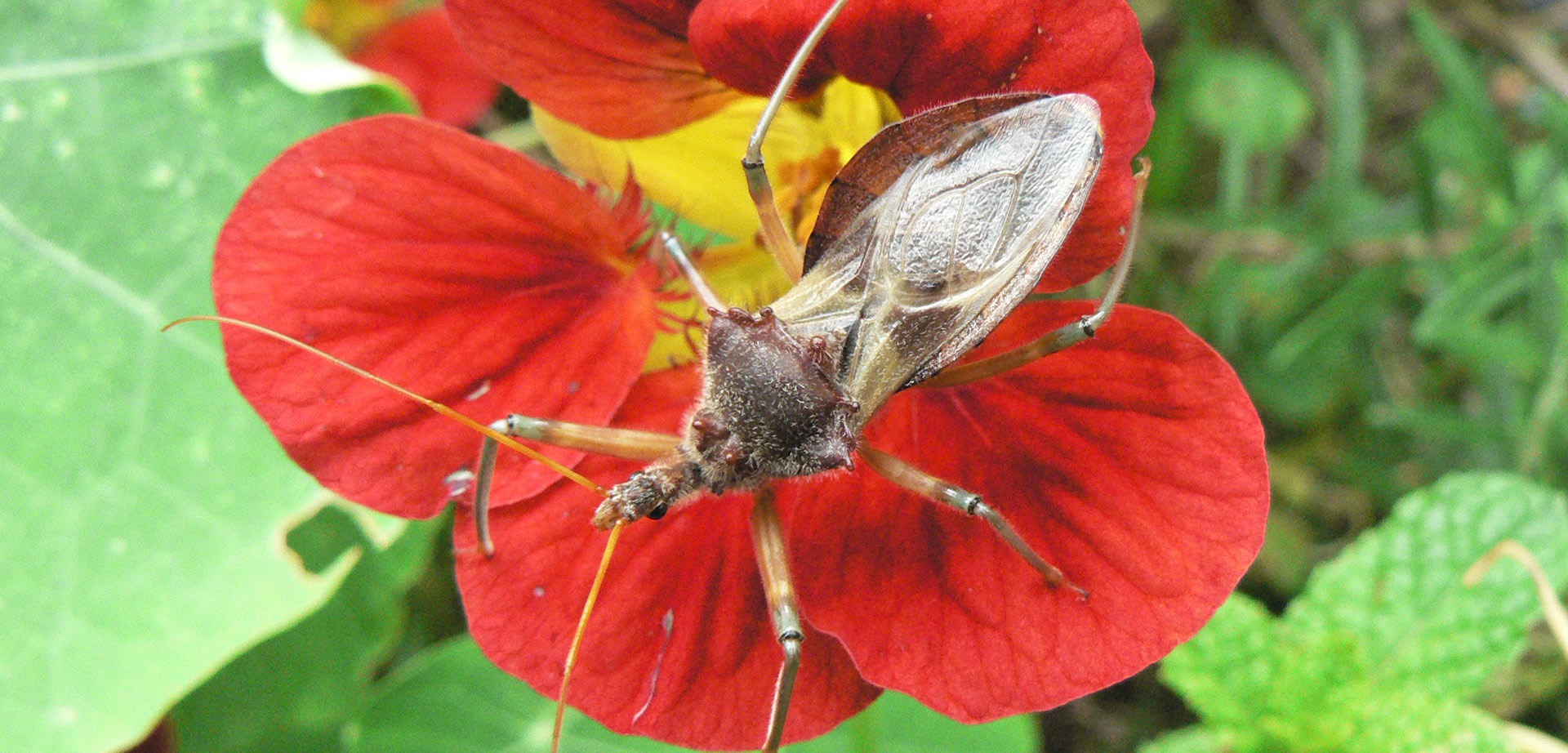
All you can eat
We rely on insects to pollinate our crops, enrich our soil, clean up after us and provide a vast array of materials which we use to feed, clothe and shelter ourselves. On the other hand, some insects are responsible for the destruction of crops and the spread of disease. Learn how insects obtain their food from plants and other animals in a wide range of different habitats and how the ecoservices they provide maintain the delicate balance within food webs and maintain the health of ecosystems. This workshop will teach students how to identify the roles organisms play in a habitat, understand the relationships between insects and their food and appreciated the complex and delicate nature of food webs. Version 9 AC9S4U01 for Year 4 Primary Connections – Sustain the Chain for Year 4
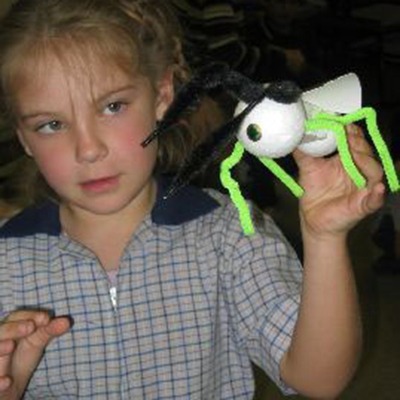
Build-a-bug
This hands-on workshop combines insect classification and morphology with the fun of designing and making your own insect. Students will learn the differences between insects and their close relatives such as spiders, scorpions, millipedes and centipedes. They will see preserved displays of these minibeasts from all around the world and will also meet some live Australian insects. We explore the external features of an insect’s body, what they are used for and how they differ depending on where the insect lives, how it moves and what it eats. With this in mind, students will then construct their own insect using provided materials. This is a fantastic workshop that teaches scientific concepts, in a fun and interactive way. As well as supporting the Australian Science curriculum, it is also a fun way to finish up a unit focused on biological science and rewards students’ hard work throughout the Term. Version 8.4 ACSSU002 for Prep ACSSU017 for Year 1 ACSSU211 for Year 1 Primary Connections – Staying Alive for Prep Primary Connections – Schoolyard Safari for Year 1 Version 9 AC9S1U01 for Year 1 AC9S3U01 for Year 3 Primary Connections – Finding Features for Prep Primary Connections – Thrive and Survive for Year 1
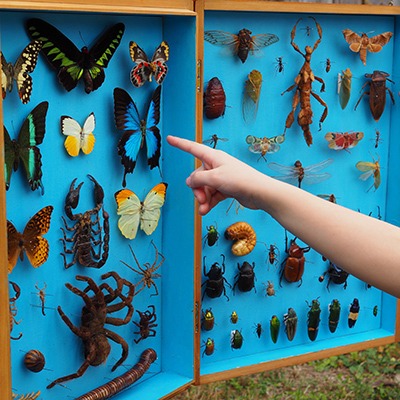
Insect Pinning & Mounting
Traditionally reserved for high school students, an increasing number of younger students have taken up the challenge of learning how to start an insect collection. This workshop is suitable for students aged 8 and up. They will learn everything they need to know including how to collect, mount, label, preserve and present an insect collection. As part of this workshop, students will be provided with a setting board, pins, mounting needles, labelling card, instruction booklet and an Australian butterfly and beetle/bug to mount. This is a great workshop to compliment insect classification. Version 8.4 ACSSU044 for Year 3 Primary Connections – Feathers, Fur or Leaves for Year 3
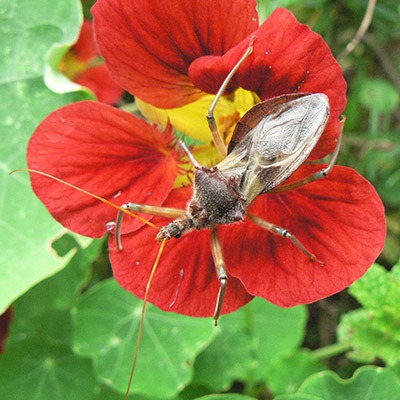
Friends or Foes
We rely on insects to pollinate our crops, enrich our soil, clean up after us and provide a vast array of materials which we use to feed, clothe and shelter ourselves. On the other hand, some insects are responsible for the destruction of crops and the spread of disease. This workshop teaches students about pest and beneficial insects and how they impact on our way of life. We investigate how some insects can be used to fight crop pests and eradicate weeds and also explore the insects that can bite us, annoy us or make us sick. Students will enjoy learning about familiar insects such as lady beetles, assassin bugs, dung beetles, bees, cockroaches and more. This is an excellent workshop for understanding our relationship with insects and how we interact with them in the web of life. This workshop addresses the following Biological Science curriculum content descriptions: Version 8.4 ACSSU073 for Year 4 Primary Connections - Friends or Foes for Year 4
Secondary School Workshops
Our secondary school workshop topics have been carefully developed and are continually revised to compliment the Australian Curriculum in Science: Year 7 to Year 10 and the Senior Secondary Curriculum in Biological Sciences. Whether your school has implemented the Australian Curriculum V9 or still operates under version 8.4, there is bound to be a Bugs Ed. workshop that will suit your requirements.
Insects are a wonderful tool to illustrate biodiversity, evolution, adaptation, food webs and symbiosis. Our different topics help students to develop an understanding of living things and their interactions within ecosystems and to identify how these ecosystems respond to change.
Our workshops combine a PowerPoint presentation with amazing photographs to introduce key concepts, large display cases of preserved insects and arachnids from around the world and live Australian insects to see up-close. Our presenters are all tertiary-qualified entomologists who not only handle the curliest questions, but are positive role models and can offer advice for anyone considering embarking on a career in science.
Click on the topics below to learn more about the workshops available, choose from one of the primary school topics (which can be adapted for an older audience) or contact us to have one specially designed to meet your requirements.
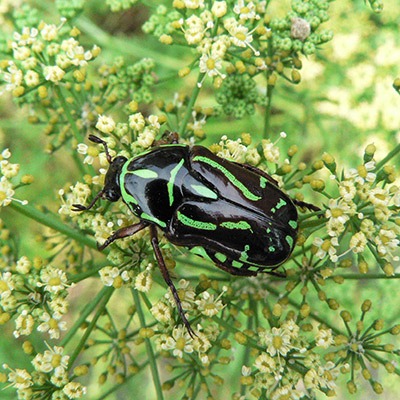
Insects in Ecosystems
Insects are the largest and most diverse assemblage of organisms on the planet. They occupy every possible niche within the food web and have evolved their bodies to help them exploit a variety of different food sources. They form intricate & complex relationships with other organisms such as plants, fungi and both invertebrate and vertebrate animals, including humans. This workshop explores how insects interact with other organisms, including us, in the web of life. We examine different examples of symbiotic relationships and explore the great diversity of habitats insects occupy and the foods they eat. We look at how insects may impact on our way of life (both positively and negatively) and conversely, how human activities effect the diversity, abundance and survival of insects. This workshop will help students understand interactions between organisms such as predator/prey relationships, parasites, competitors, pollinators & disease. It is a great workshop for introducing biological science concepts such as symbiosis, food webs, evolution and diversity. Version 8.4 ACSSU0112 for Year 7 ACSSU0176 for Year 9 Senior secondary curriculum: Biology Version 8.4 Unit 1: Biodiversity and the interconnectedness of life ACSBL006 ACSBL019 ACSBL028
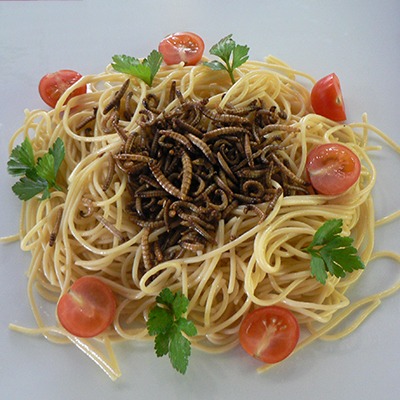
Eating insects for sustainability
By 2050, Earth will be home to 9 billion people. How will we feed them all? A 2013 report by the United Nations has suggested we follow the lead of many non-Western societies around the world and consume insects in order to meet our populations’ ever-growing protein needs. In this workshop we learn how sustainable insect farming can reduce land clearing, slash greenhouse gas emissions and reduce food waste, as well as provide a nutritionally superior (and pretty delicious!) source of protein. See displays of popular insect cuisine from around the world, such as mealworm spaghetti, stir-fried crickets and grasshopper tacos. Students can even have the opportunity to make and eat their own chocolate-covered mealworm and sample some delicious chocolate chip cookies made from protein-rich mealworm flour. This workshop shines a spotlight on sustainability and is relevant across several learning areas, such as Biological Sciences; Humanities and Social Sciences; and Geography. Senior secondary curriculum: Biology Unit 1: Biodiversity and the interconnectedness of life ACSBL011 ACSBL014 Senior secondary: Humanities and Social Sciences Unit 2: Sustainable places ACHGE048 ACHGE049 ACHGE052 ACHGE053
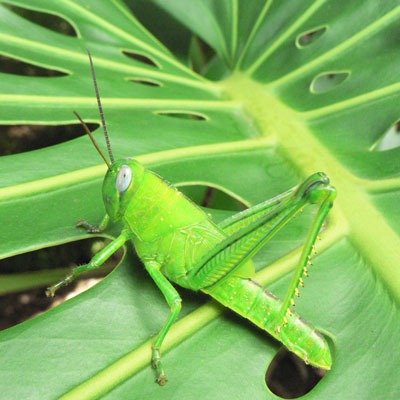
Insect Classification
This workshop explores how classification helps to organise diverse groups of organisms such as insects. We discuss the morphology, behaviour, reproduction, metamorphosis and ecology of different insect groups and explain how these factors contribute to their enormous success and diversity. Students will use a specially designed dichotomous key to classify provided insect specimens into various Orders, giving them the opportunity to work with some unique Australian insects. This is a fun, hands-on workshop that illustrates the use of dichotomous keys in science and introduces key concepts and terminology for the classification of organisms. This workshop is great for teaching students how living things can be grouped on the basis of observable features and can be distinguished from non-living things. Under the senior secondary curriculum: Biology, this workshop teaches students to use classification keys to identify organisms as a means to help organise, analyse and communicate data about biodiversity. Version 8.4 ACSSU111 for Year 7 Version 9 AC9S7U01 for Year 7 Senior secondary curriculum: Biology Version 8.4 Unit 1: Biodiversity and the interconnectedness of life ACSBL006 ACSBL016
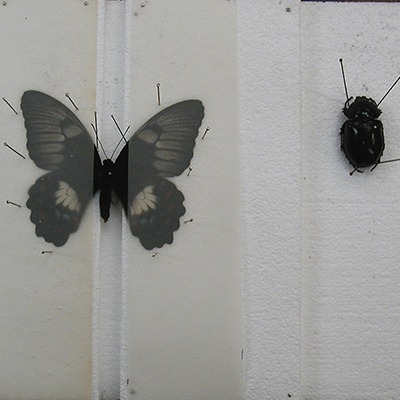
© Mount Glorious Biological Centre
Insect Pinning & Mounting
Fieldwork is an important part of studying biological science and gives students valuable opportunities to collect and display data first-hand in order to understand local ecosystem interactions. Collecting and comparing a diversity of insects is just one way to illustrate how the physical environment, human influences, climatic conditions and health of a habitat can influence the diversity and abundance of organisms found there.. Insects are readily found in all environments all year round, making them an ideal research tool for both class investigations and independent research projects. This workshop teaches students everything they need to know on how to catch, mount, label, preserve and present an insect collection for scientific research. As part of this workshop, students will be provided with a setting board, pins, mounting needles, labelling card, instruction booklet and an Australian butterfly and beetle/bug to mount. Version 8.4 ACSSU111 for Year 7 Version 9 AC9S7U01 for Year 7 Senior secondary curriculum: Biology Version 8.4 Unit 1: Biodiversity and the interconnectedness of life ACSBL006 ACSBL016
The following Primary workshop topics can be modified to address the senior science biology content descriptions. Secrets to Success ACSBL019 All you can eat ACSBL020
Vacation Care
School holidays are a great time to explore the amazing world of insects and minibeasts around us. Our vacation care workshops have been carefully designed to provide the right balance of learning and hands-on fun. By combining stunning photographs, displays of preserved specimens and live local insects, students of all ages and year levels will be engaged and excited. With hands-on resources to see and touch and ample time to ask questions, our workshops will keep even the most fidgety holiday goers engaged and entertained.
The topics below are our most popular choices for vacation care groups, but feel free to choose from any of our primary school topics. We can even offer bug hunts/walks around the school grounds or run workshops on how to make your own insect collections for older students. Please contact us to discuss your options

Build-a-Bug
This hands-on workshop combines our usual amazing displays of minibeasts with the fun of designing and making your own insect.
By looking closely at our cases of preserved insects from around the world, kids will learn about the external features of an insect’s body and see how they differ depending on where the insect lives, how it moves and what it eats. With this in mind, students will then construct their own insect using provided craft materials.
With the chance to hold a live stick insect, resin blocks of preserved minibeasts to pass around and time to ask all of their curly insect questions, this a fun, interactive experience for any age.

Secrets to Success
Insects are the most diverse and successful group of organisms on Earth. They have walked the planet for nearly 400 million years and during this time have colonised every possible habitat.
They come in a huge variety of shapes and sizes, from the beautiful to the downright bizarre! Learn how they capture prey and exploit different food sources, elude predators and cope with life in harsh environments.
This workshop is a great introduction to the world of insects and minibeasts for all ages. It combines amazing insect images, large display cases of preserved insects and arachnids from around the world and live Australian insects (you can even hold a stick insect!) into one action-packed session.

